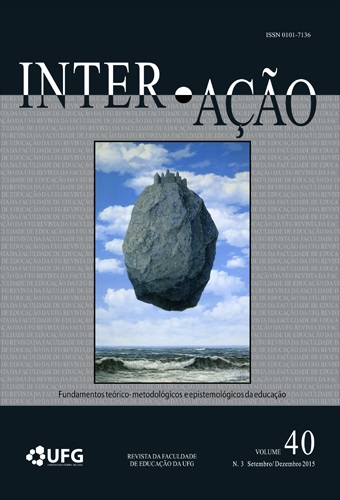DISCURSOS QUE PRODUZEM A EDUCAÇÃO BILÍNGUE PARA SURDOS NA ATUALIDADE
DOI:
https://doi.org/10.5216/ia.v40i3.36489Palavras-chave:
Discursos. Educação Bilíngue. Surdos. Políticas Educacionais.Resumo
Que discursos vêm produzindo a educação bilíngue para surdos no cenário educacional brasileiro na atualidade? Para problematizar essa questão, olhamos para documentos produzidos pelo Ministério da Educação (MEC) e pela Federação Nacional de Educação e Integração dos Surdos (FENEIS) que tratam da educação bilíngue para surdos, tendo como ferramenta teórico-metodológica a noção de discurso de Michel Foucault (2013), para quem os discursos produzem práticas. Em nossas análises, buscamos dar visibilidade para as relações de saber-poder que estão imbricadas nos discursos que constituem os documentos analisados e os modos específicos de se pensar a escolarização para surdos que vêm sendo produzidos a partir dos significados de educação bilíngue que circulam em tais documentos.
Downloads
Downloads
Publicado
Como Citar
Edição
Seção
Licença
A Inter-Ação utiliza como base para transferência de direitos a licença Creative Commons Attribution 4.0 para periódicos de acesso aberto (Open Archives Iniciative - OAI). Por acesso aberto entende-se a disponibilização gratuita na Internet, para que os usuários possam ler, baixar, copiar, distribuir, imprimir, pesquisar ou referenciar o texto integral dos documentos, processá-los para indexação, utilizá-los como dados de entrada de programas para softwares, ou usá-los para qualquer outro propósito legal, sem barreira financeira, legal ou técnica.
Autores que publicam neste periódico concordam com os seguintes termos:
1) Autores mantém os direitos autorais e concedem à revista o direito de primeira publicação, com o trabalho simultaneamente licenciado sob a Licença Creative Commons Attribution que permite o compartilhamento do trabalho com reconhecimento da autoria e publicação inicial nesta revista.
2) Autores têm autorização para assumir contratos adicionais separadamente, para distribuição não-exclusiva da versão do trabalho publicada nesta revista (ex.: publicar em repositório institucional ou como capítulo de livro), com reconhecimento de autoria e publicação inicial nesta revista.
3) Autores têm permissão e são estimulados a publicar e distribuir seu trabalho online (ex.: em repositórios institucionais ou na sua página pessoal) a qualquer ponto antes ou durante o processo editorial, já que isso pode gerar alterações produtivas, bem como aumentar o impacto e a citação do trabalho publicado.















